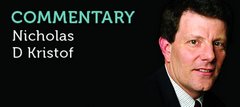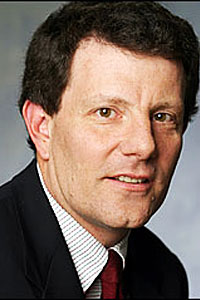Over the past two decades, Canada has had eight mass shootings. Just so far this month, the United States has already had 20.
Canada has a much smaller population, of course, and the criteria that researchers used for each country are slightly different, but that still says something important about public safety.
Could it be, as Donald Trump suggests, that the peril comes from admitting Muslims? On the contrary, Canadians are safe despite having been far more hospitable to Muslim refugees: Canada has admitted more than 27,000 Syrian refugees since November, some 10 times the number the United States has.

Nicholas D Kristof is a columnist with The New York Times.
More broadly, Canada's population is 3.2% Muslim, while the United States is about 1% Muslim -- yet Canada doesn't have massacres like the one we just experienced at a gay nightclub in Orlando, Florida, or the one in December in San Bernardino, California. So perhaps the problem isn't so much Muslims out of control but guns out of control.
I grew up on a farm with guns. One morning when I was 10, we awoke at dawn to hear our chickens squawking frantically and saw a fox trotting away with one of our hens in its mouth. My dad grabbed his .308 rifle, opened the window and fired twice. The fox was unhurt but dropped its breakfast and fled. The hen picked herself up and walked back to the barn. So in the right context, guns have their uses. The problem is that we make no serious effort to keep firearms out of the hands of violent people. A few data points:
-- More Americans have died from guns, including suicides, since just 1970 than died in all the wars in US history going back to the American Revolution.
-- The Civil War marks by far the most savage period of warfare in US history. But more Americans are now killed from guns annually, again including suicides, than were killed by guns on average each year during the Civil War (when many of the deaths were from disease, not guns).
-- In the United States, more preschoolers up through age four are shot dead each year than police officers are.
Canada has put in place measures that make it more difficult for a dangerous person to acquire a gun, with a focus not so much on banning weapons entirely (the AR-15 is available after undergoing safety training and a screening) as on limiting who can obtain one. In the United States, we lack even universal background checks, and new Harvard research to be published soon found that 40% of gun transfers didn't even involve a background check.
We can't prevent every gun death any more than we can prevent every car accident, and the challenge is particularly acute with homegrown terrorists like the one in Orlando. But experts estimate that a serious effort to reduce gun violence might reduce the toll by one-third, which would be more than 10,000 lives saved a year. The Orlando killer would have been legally barred from buying lawn darts, because they were banned as unsafe. He would have been unable to drive a car that didn't pass a safety inspection or that lacked insurance. He couldn't have purchased a black water gun without an orange tip -- because that would have been too dangerous. But it's not too dangerous to allow the sale of an assault rifle without even a background check?
If we're trying to prevent carnage like that of Orlando, we need to be vigilant not only about infiltration by the Islamic State (IS), and not only about US citizens poisoned into committing acts of terrorism. We also need to be vigilant about National Rifle Association-type extremism that allows guns to be sold without background checks. It's staggering that Congress doesn't see a problem with allowing people on terror watch lists to buy guns: In each of the past three years, more than 200 people on the terror watch list have been allowed to purchase guns. We empower the IS when we permit acolytes like the Orlando killer, investigated repeatedly as a terrorist threat, to buy a Sig Sauer MCX and a Glock 17 handgun on consecutive days.
A great majority of Muslims are peaceful, and it's unfair to blame Islam for terrorist attacks like the one in Orlando. But it is important to hold accountable Gulf states like Saudi Arabia that are wellsprings of religious zealotry, intolerance and fanaticism. We should also hold accountable our own political figures who exploit tragic events to sow bigotry. And, yes, that means Donald Trump.
When Mr Trump scapegoats Muslims, that also damages our own security by bolstering the us-versus-them narrative of the IS. The lesson of history is that extremists on one side invariably empower extremists on the other.
So by all means, Muslims around the world should stand up to their fanatics sowing hatred and intolerance -- and we Americans should stand up to our own extremists doing just the same. ©2016 the New York Times.
